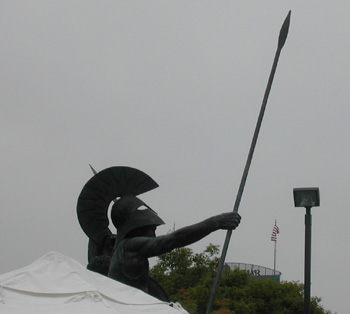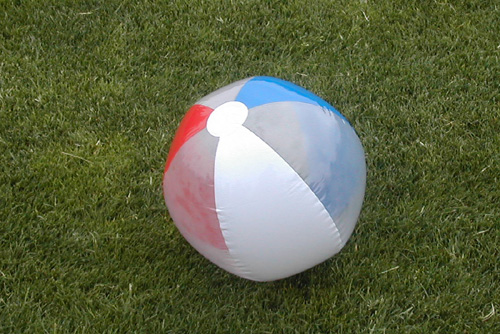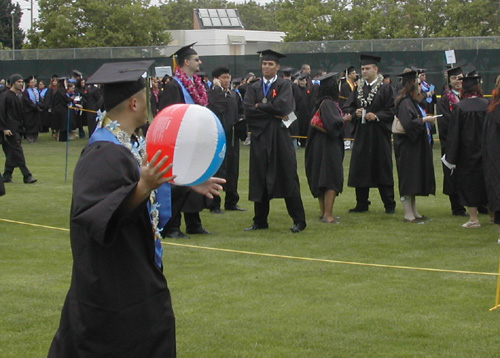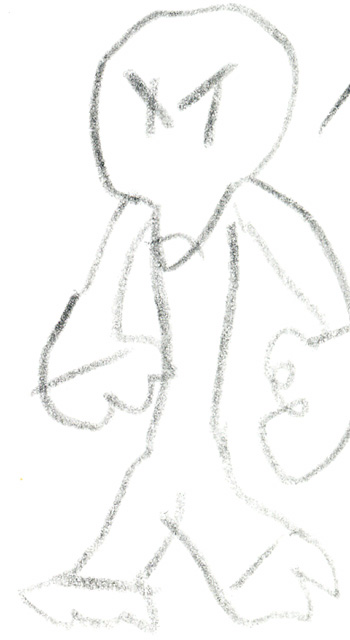
Having finished grading (yea, having submitted the final grades themselves), I attempt to resurface from my cave.
It’s really rather bright out here!
Anyway, as you will have deduced from my last post, there was a commencement-sized break in my grading activities on Saturday. The commencement speaker, Google senior vice president of global sales and business development Omid Kordestani, gave a nice address to the grads and their guests, so I’m reporting on his big points here.
Author Archives: admin
A commencement story.

Ahem.
Beach ball here! Kids, I’m not going to march myself into the stadium!

That’s better. Thanks dude!
Friday Sprog Blogging: our version of hearts and flowers.
Since folks in the U.S. have a long weekend, and because the last entry was younger-offspring-centric, you get a bonus Sprog Blog.
Elder offspring: (following up a request at breakfast for a slice of bagel with avocado spread on it) It’s not brown avocado, is it?
Dr. Free-Ride: No, it’s just ripe and freshly spooned out of its skin. So it will be nice and green.
Elder offspring: Good.
Dr. Free-Ride: Hey, do you know why avocado turns brownish if it’s out of the skin awhile?
Elder offspring: No.
Dr. Free-Ride: “Oxidation”. It reacts with the oxygen in the air, and the reaction converts the green stuff to brownish stuff.
Elder offspring: Weird.
Dr. Free-Ride: Can you think of anything else where reacting with oxygen in the air might change the color of something?
Elder offspring: If I hold my breath, I’ll turn blue.
Dr. Free-Ride: Hmm. That’s a change in color that has to do with a lack of oxygen. What about blood?
Elder offspring: It’s red.
Dr. Free-Ride: But did you know that it’s red because there’s oxygen bound to its hemoglobin? When the oxygen it’s carrying is used up, it isn’t red until it picks up more oxygen.
Elder offspring: No way!
Dr. Free-Ride: It’s true. Have a look at your arms for a minute. See those veins by your wrists?
Elder offspring: They look blue.
Dr. Free-Ride: That’s blood that’s delivered its oxygen and needs to get more.
Elder offspring: Cool.
Elder offspring’s blood-related artwork after the jump.
Friday Sprog Blogging: oh, grow up!

A conversation with the younger Free-Ride offspring at the elder Free-Ride offspring’s soccer practice this week:
Dr. Free-Ride: Hey, can you tell me about the science you’ve learned in kindergarten this year?
Younger offspring: No.
Dr. Free-Ride: Why not?
Younger offspring: We haven’t really learned any science yet.
Dr. Free-Ride: Child, it’s almost June! If you haven’t really learned any science in kindergarten yet, when is it going to happen?
Younger offspring: I don’t know.
Dr. Free-Ride: Well, what kind of science would you like to learn about?
Younger offspring: Maybe about stuff under the sea.
Dr. Free-Ride: Hmm. I’ll see if we can manage that. There’s a place I could look. How about giant flightless birds? Would you like to learn about them?
Younger offspring: Of course!
* * * * *
After this Saturday, it’s all gravy!
This post brought to you by my intense desire to avoid grading any more papers.
More than a dozen years ago, when I earned my Ph.D. in chemistry, I made what many at the time viewed as a financially reckless decision and purchased academic regalia rather than just renting it.
Where do you want scientists to learn ethics?
Because I am engaged in a struggle with mass quantities of grading, I’m reviving a post from the vault to tide you over. I have added some new details in square brackets, and as always, I welcome your insight here.
Wednesday Sprog Blogging: ravens and crows.
Yes, there will still be Friday Sprog Blogging this Friday. No, Wednesday Sprog Blogging is not going to become a regular feature.
On the walk to school this morning:
Younger offspring: I wonder if we’ll see that pair of crows or ravens on the field again today. I like how they can jump.
Dr. Free-Ride: Hey, you know how you asked me yesterday morning what the difference was between crows and ravens?
Younger offspring: Yeah?
Dr. Free-Ride: I did a little research to find out.
Lowered expectations.
I used to think what I really needed this time of semester was elves.
Norms are what we ought to do, not what we suspect everyone actually does.
In the comments on a number of recent posts, I’ve been sensing a certain level of cynicism about the realities of scientific practice, and it’s been bumming me out. (In fairness, as I reread those comment threads today, the comments aren’t as jaded as I remember them being; it’s probably that the ones with a cynical edge are staying with me a bit longer.)
I am not bummed because I think people ought to have a picture of the scientific community as one where everyone is happy and smiling, holding hands and singing and wanting to buy the world a Coke. What’s sticking in my craw a little is the “Eh, what are you gonna do?” note of resignation about some of the problematic behaviors and outcomes that are acknowledged to be even more common than the headlines would lead us to believe.
I do not think we can afford to embrace resignation here. I think that seeing the problems actually saddles us with some responsibilty to do something about them.
Why reading novels in school isn’t a waste of time.
Ann Althouse asks why schools should bother having kids read fiction:
And why does reading even need to be a separate subject from history in school? Give them history texts and teach reading from them. Science books too. Leave the storybooks for pleasure reading outside of school. They will be easier reading, and with well-developed reading skills, kids should feel pleasure curling up with a novel at home. But even if they don’t, why should any kind of a premium be placed on an interest in reading novels? It’s not tied to economic success in life and needn’t be inculcated any more than an interest in watching movies or listening to popular music. Leave kids alone to find out out what recreational activities enrich and satisfy them. Some may want to dance or play music or paint. Just because teachers tend to be the kind of people who love novels does not mean that this choice ought to be imposed on young people via compulsory education. Teach them about history, science, law, logic — something academic and substantive — and leave the fictional material for after hours.
Now, I have someplace to be in an hour (actually two places I’m supposed to be, but set that problem aside). However, seeing as how I taught “Philosophy and Literature” this term and I seem to have some pre-existing views on the stuff a good education can and should deliver, I’m going to shoot from the hip and see how many reasons I can enumerate for getting kids to read fiction in school:
